HR Professional Development: Individuals, Teams, and Organisations
VerifiedAdded on 2023/06/07
|16
|4405
|266
Report
AI Summary
This report provides a comprehensive analysis of developing individuals, teams, and organizations, with a focus on the knowledge, skills, and behaviors required by HR professionals. It includes a personal skills audit and professional development plan, an analysis of the differences between organizational and individual learning, training, and development, and the need for continuous learning to drive sustainable business performance. The report also examines how High-Performance Work practices (HPW) contribute to employee engagement and competitive advantage, using Tesco as a case study. Different approaches to performance management are evaluated, and judgments are made on their effectiveness in supporting a high-performance culture and commitment. The conclusion synthesizes knowledge and information, resulting in appropriate judgments on how HPW and its supporting mechanisms lead to improved employee engagement, commitment, and competitive advantage.
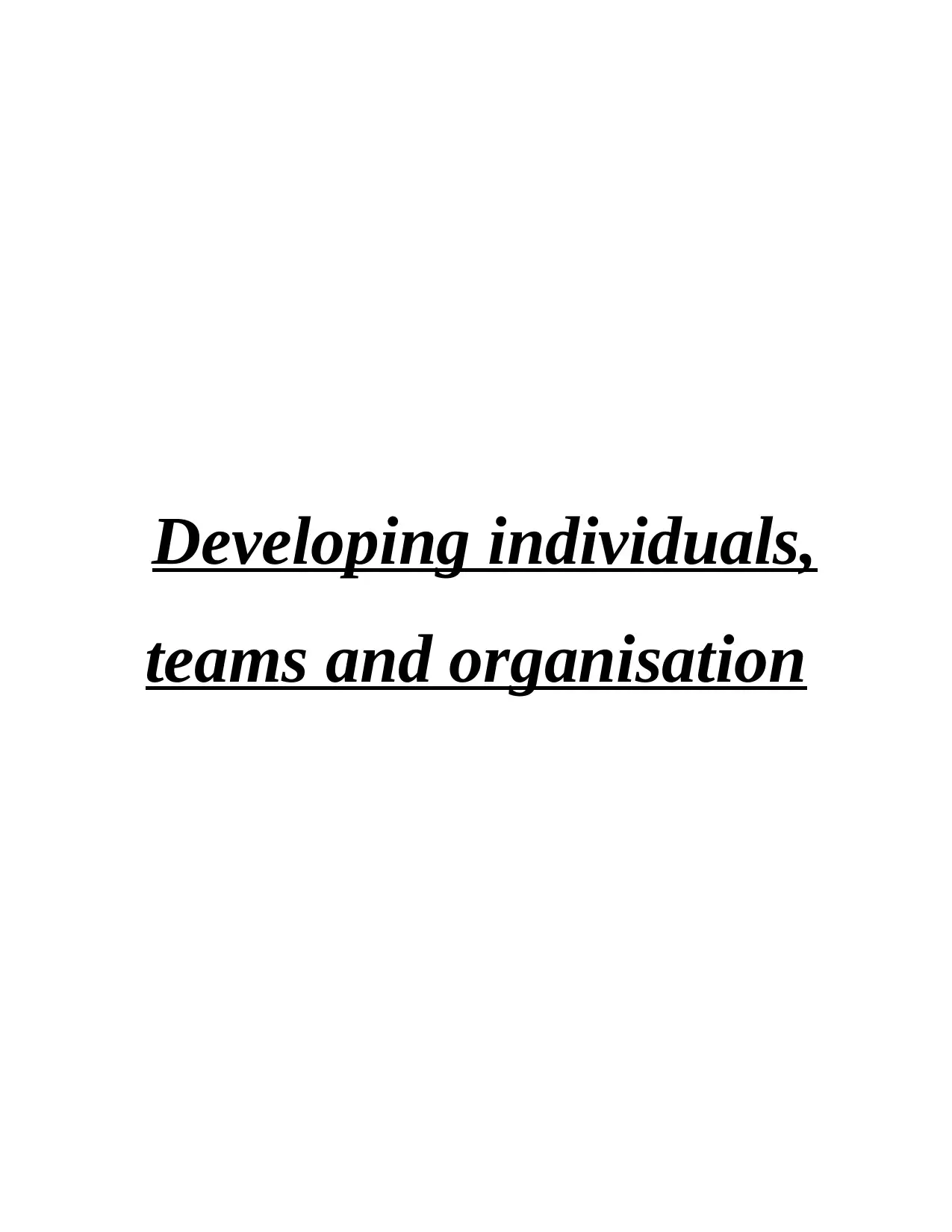
Developing individuals,
teams and organisation
teams and organisation
Paraphrase This Document
Need a fresh take? Get an instant paraphrase of this document with our AI Paraphraser
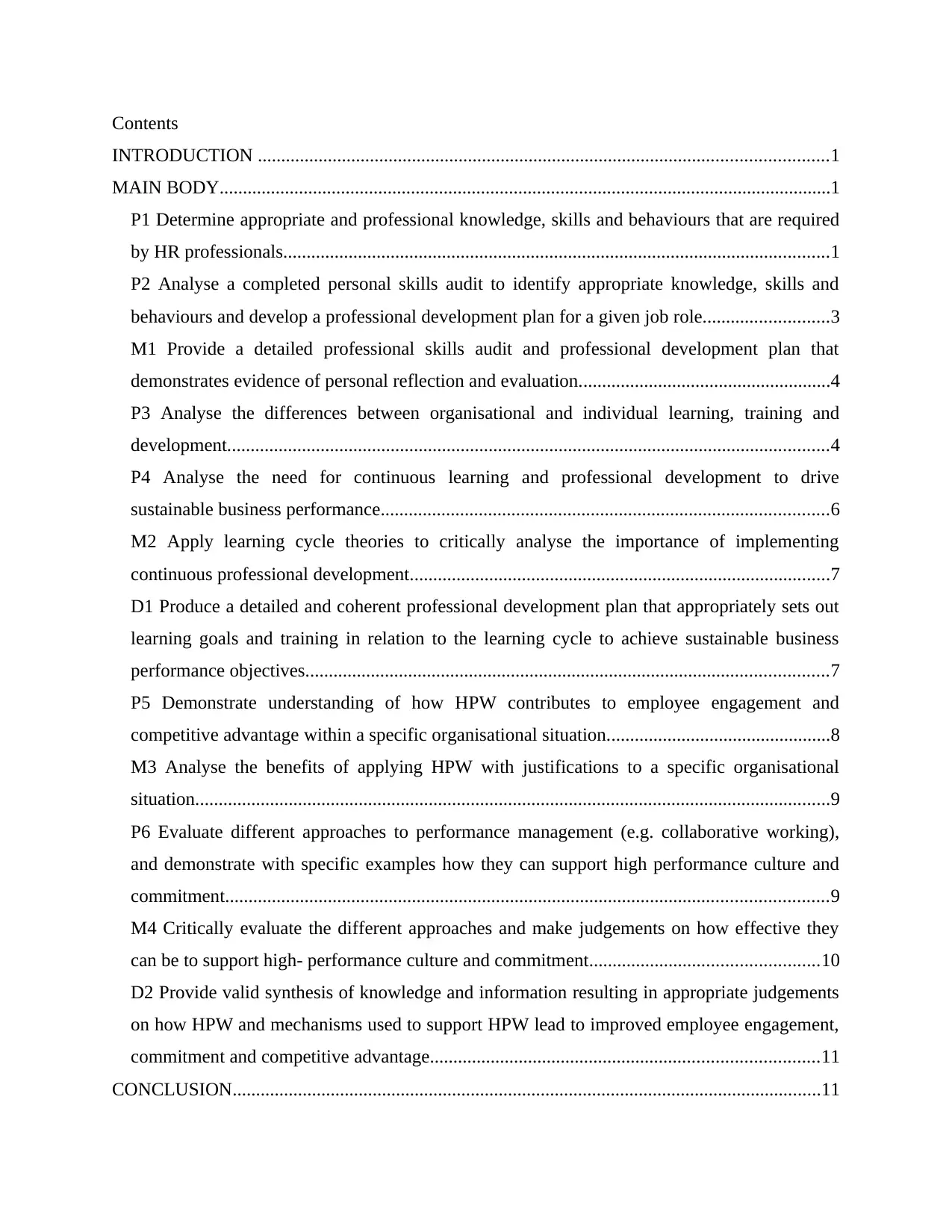
Contents
INTRODUCTION ..........................................................................................................................1
MAIN BODY...................................................................................................................................1
P1 Determine appropriate and professional knowledge, skills and behaviours that are required
by HR professionals.....................................................................................................................1
P2 Analyse a completed personal skills audit to identify appropriate knowledge, skills and
behaviours and develop a professional development plan for a given job role...........................3
M1 Provide a detailed professional skills audit and professional development plan that
demonstrates evidence of personal reflection and evaluation......................................................4
P3 Analyse the differences between organisational and individual learning, training and
development.................................................................................................................................4
P4 Analyse the need for continuous learning and professional development to drive
sustainable business performance................................................................................................6
M2 Apply learning cycle theories to critically analyse the importance of implementing
continuous professional development..........................................................................................7
D1 Produce a detailed and coherent professional development plan that appropriately sets out
learning goals and training in relation to the learning cycle to achieve sustainable business
performance objectives................................................................................................................7
P5 Demonstrate understanding of how HPW contributes to employee engagement and
competitive advantage within a specific organisational situation................................................8
M3 Analyse the benefits of applying HPW with justifications to a specific organisational
situation........................................................................................................................................9
P6 Evaluate different approaches to performance management (e.g. collaborative working),
and demonstrate with specific examples how they can support high performance culture and
commitment.................................................................................................................................9
M4 Critically evaluate the different approaches and make judgements on how effective they
can be to support high- performance culture and commitment.................................................10
D2 Provide valid synthesis of knowledge and information resulting in appropriate judgements
on how HPW and mechanisms used to support HPW lead to improved employee engagement,
commitment and competitive advantage...................................................................................11
CONCLUSION..............................................................................................................................11
INTRODUCTION ..........................................................................................................................1
MAIN BODY...................................................................................................................................1
P1 Determine appropriate and professional knowledge, skills and behaviours that are required
by HR professionals.....................................................................................................................1
P2 Analyse a completed personal skills audit to identify appropriate knowledge, skills and
behaviours and develop a professional development plan for a given job role...........................3
M1 Provide a detailed professional skills audit and professional development plan that
demonstrates evidence of personal reflection and evaluation......................................................4
P3 Analyse the differences between organisational and individual learning, training and
development.................................................................................................................................4
P4 Analyse the need for continuous learning and professional development to drive
sustainable business performance................................................................................................6
M2 Apply learning cycle theories to critically analyse the importance of implementing
continuous professional development..........................................................................................7
D1 Produce a detailed and coherent professional development plan that appropriately sets out
learning goals and training in relation to the learning cycle to achieve sustainable business
performance objectives................................................................................................................7
P5 Demonstrate understanding of how HPW contributes to employee engagement and
competitive advantage within a specific organisational situation................................................8
M3 Analyse the benefits of applying HPW with justifications to a specific organisational
situation........................................................................................................................................9
P6 Evaluate different approaches to performance management (e.g. collaborative working),
and demonstrate with specific examples how they can support high performance culture and
commitment.................................................................................................................................9
M4 Critically evaluate the different approaches and make judgements on how effective they
can be to support high- performance culture and commitment.................................................10
D2 Provide valid synthesis of knowledge and information resulting in appropriate judgements
on how HPW and mechanisms used to support HPW lead to improved employee engagement,
commitment and competitive advantage...................................................................................11
CONCLUSION..............................................................................................................................11

REFERENCES..............................................................................................................................13
⊘ This is a preview!⊘
Do you want full access?
Subscribe today to unlock all pages.

Trusted by 1+ million students worldwide
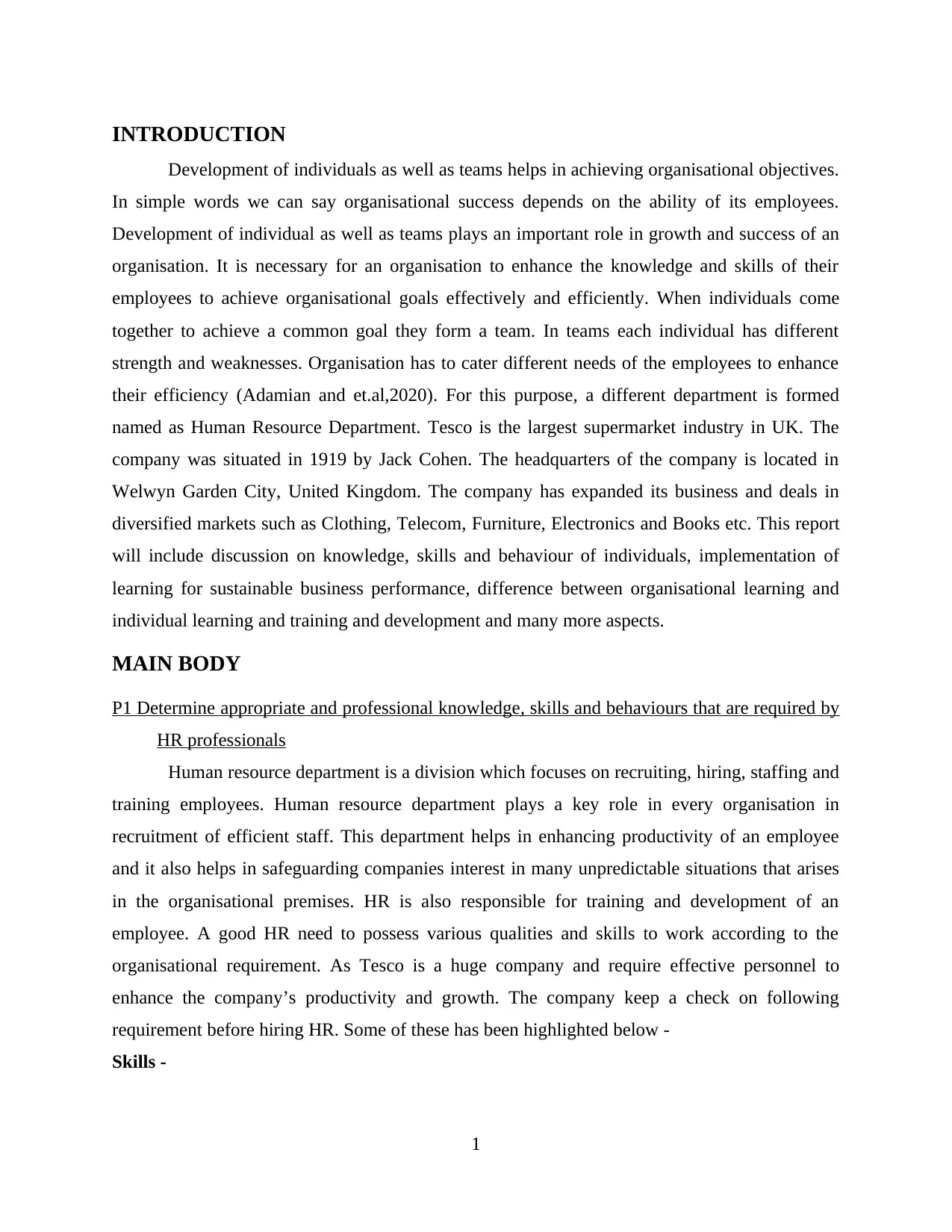
INTRODUCTION
Development of individuals as well as teams helps in achieving organisational objectives.
In simple words we can say organisational success depends on the ability of its employees.
Development of individual as well as teams plays an important role in growth and success of an
organisation. It is necessary for an organisation to enhance the knowledge and skills of their
employees to achieve organisational goals effectively and efficiently. When individuals come
together to achieve a common goal they form a team. In teams each individual has different
strength and weaknesses. Organisation has to cater different needs of the employees to enhance
their efficiency (Adamian and et.al,2020). For this purpose, a different department is formed
named as Human Resource Department. Tesco is the largest supermarket industry in UK. The
company was situated in 1919 by Jack Cohen. The headquarters of the company is located in
Welwyn Garden City, United Kingdom. The company has expanded its business and deals in
diversified markets such as Clothing, Telecom, Furniture, Electronics and Books etc. This report
will include discussion on knowledge, skills and behaviour of individuals, implementation of
learning for sustainable business performance, difference between organisational learning and
individual learning and training and development and many more aspects.
MAIN BODY
P1 Determine appropriate and professional knowledge, skills and behaviours that are required by
HR professionals
Human resource department is a division which focuses on recruiting, hiring, staffing and
training employees. Human resource department plays a key role in every organisation in
recruitment of efficient staff. This department helps in enhancing productivity of an employee
and it also helps in safeguarding companies interest in many unpredictable situations that arises
in the organisational premises. HR is also responsible for training and development of an
employee. A good HR need to possess various qualities and skills to work according to the
organisational requirement. As Tesco is a huge company and require effective personnel to
enhance the company’s productivity and growth. The company keep a check on following
requirement before hiring HR. Some of these has been highlighted below -
Skills -
1
Development of individuals as well as teams helps in achieving organisational objectives.
In simple words we can say organisational success depends on the ability of its employees.
Development of individual as well as teams plays an important role in growth and success of an
organisation. It is necessary for an organisation to enhance the knowledge and skills of their
employees to achieve organisational goals effectively and efficiently. When individuals come
together to achieve a common goal they form a team. In teams each individual has different
strength and weaknesses. Organisation has to cater different needs of the employees to enhance
their efficiency (Adamian and et.al,2020). For this purpose, a different department is formed
named as Human Resource Department. Tesco is the largest supermarket industry in UK. The
company was situated in 1919 by Jack Cohen. The headquarters of the company is located in
Welwyn Garden City, United Kingdom. The company has expanded its business and deals in
diversified markets such as Clothing, Telecom, Furniture, Electronics and Books etc. This report
will include discussion on knowledge, skills and behaviour of individuals, implementation of
learning for sustainable business performance, difference between organisational learning and
individual learning and training and development and many more aspects.
MAIN BODY
P1 Determine appropriate and professional knowledge, skills and behaviours that are required by
HR professionals
Human resource department is a division which focuses on recruiting, hiring, staffing and
training employees. Human resource department plays a key role in every organisation in
recruitment of efficient staff. This department helps in enhancing productivity of an employee
and it also helps in safeguarding companies interest in many unpredictable situations that arises
in the organisational premises. HR is also responsible for training and development of an
employee. A good HR need to possess various qualities and skills to work according to the
organisational requirement. As Tesco is a huge company and require effective personnel to
enhance the company’s productivity and growth. The company keep a check on following
requirement before hiring HR. Some of these has been highlighted below -
Skills -
1
Paraphrase This Document
Need a fresh take? Get an instant paraphrase of this document with our AI Paraphraser
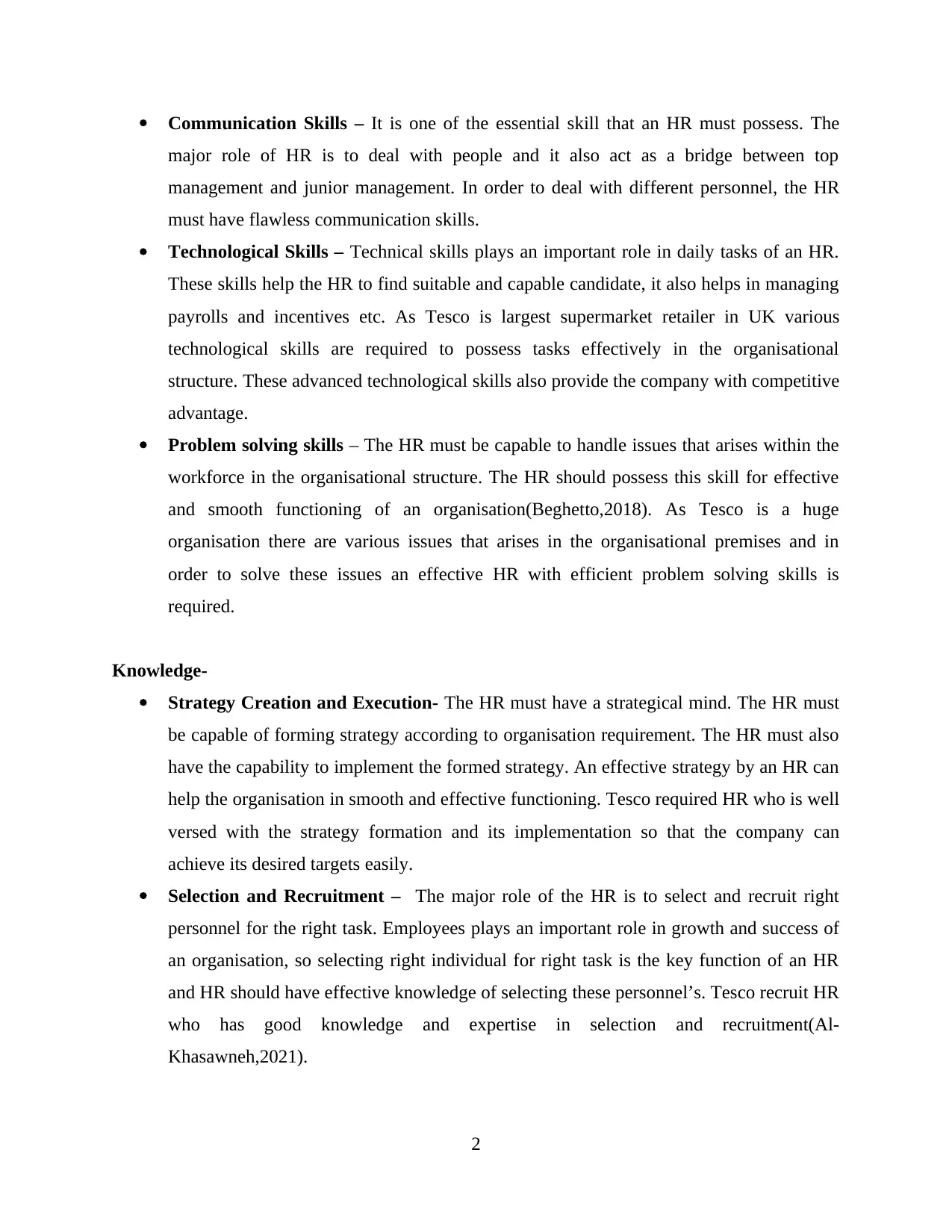
Communication Skills – It is one of the essential skill that an HR must possess. The
major role of HR is to deal with people and it also act as a bridge between top
management and junior management. In order to deal with different personnel, the HR
must have flawless communication skills.
Technological Skills – Technical skills plays an important role in daily tasks of an HR.
These skills help the HR to find suitable and capable candidate, it also helps in managing
payrolls and incentives etc. As Tesco is largest supermarket retailer in UK various
technological skills are required to possess tasks effectively in the organisational
structure. These advanced technological skills also provide the company with competitive
advantage.
Problem solving skills – The HR must be capable to handle issues that arises within the
workforce in the organisational structure. The HR should possess this skill for effective
and smooth functioning of an organisation(Beghetto,2018). As Tesco is a huge
organisation there are various issues that arises in the organisational premises and in
order to solve these issues an effective HR with efficient problem solving skills is
required.
Knowledge-
Strategy Creation and Execution- The HR must have a strategical mind. The HR must
be capable of forming strategy according to organisation requirement. The HR must also
have the capability to implement the formed strategy. An effective strategy by an HR can
help the organisation in smooth and effective functioning. Tesco required HR who is well
versed with the strategy formation and its implementation so that the company can
achieve its desired targets easily.
Selection and Recruitment – The major role of the HR is to select and recruit right
personnel for the right task. Employees plays an important role in growth and success of
an organisation, so selecting right individual for right task is the key function of an HR
and HR should have effective knowledge of selecting these personnel’s. Tesco recruit HR
who has good knowledge and expertise in selection and recruitment(Al-
Khasawneh,2021).
2
major role of HR is to deal with people and it also act as a bridge between top
management and junior management. In order to deal with different personnel, the HR
must have flawless communication skills.
Technological Skills – Technical skills plays an important role in daily tasks of an HR.
These skills help the HR to find suitable and capable candidate, it also helps in managing
payrolls and incentives etc. As Tesco is largest supermarket retailer in UK various
technological skills are required to possess tasks effectively in the organisational
structure. These advanced technological skills also provide the company with competitive
advantage.
Problem solving skills – The HR must be capable to handle issues that arises within the
workforce in the organisational structure. The HR should possess this skill for effective
and smooth functioning of an organisation(Beghetto,2018). As Tesco is a huge
organisation there are various issues that arises in the organisational premises and in
order to solve these issues an effective HR with efficient problem solving skills is
required.
Knowledge-
Strategy Creation and Execution- The HR must have a strategical mind. The HR must
be capable of forming strategy according to organisation requirement. The HR must also
have the capability to implement the formed strategy. An effective strategy by an HR can
help the organisation in smooth and effective functioning. Tesco required HR who is well
versed with the strategy formation and its implementation so that the company can
achieve its desired targets easily.
Selection and Recruitment – The major role of the HR is to select and recruit right
personnel for the right task. Employees plays an important role in growth and success of
an organisation, so selecting right individual for right task is the key function of an HR
and HR should have effective knowledge of selecting these personnel’s. Tesco recruit HR
who has good knowledge and expertise in selection and recruitment(Al-
Khasawneh,2021).
2
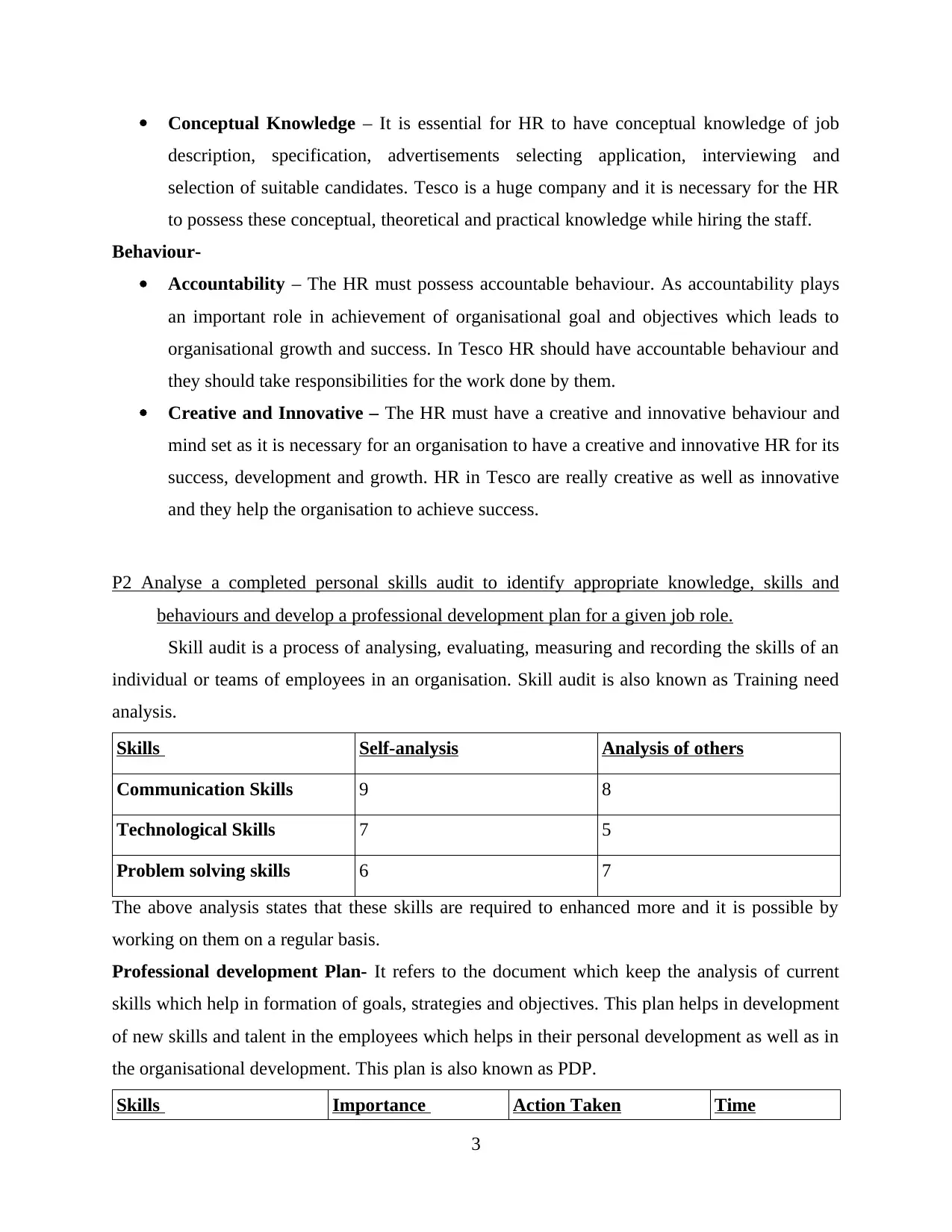
Conceptual Knowledge – It is essential for HR to have conceptual knowledge of job
description, specification, advertisements selecting application, interviewing and
selection of suitable candidates. Tesco is a huge company and it is necessary for the HR
to possess these conceptual, theoretical and practical knowledge while hiring the staff.
Behaviour-
Accountability – The HR must possess accountable behaviour. As accountability plays
an important role in achievement of organisational goal and objectives which leads to
organisational growth and success. In Tesco HR should have accountable behaviour and
they should take responsibilities for the work done by them.
Creative and Innovative – The HR must have a creative and innovative behaviour and
mind set as it is necessary for an organisation to have a creative and innovative HR for its
success, development and growth. HR in Tesco are really creative as well as innovative
and they help the organisation to achieve success.
P2 Analyse a completed personal skills audit to identify appropriate knowledge, skills and
behaviours and develop a professional development plan for a given job role.
Skill audit is a process of analysing, evaluating, measuring and recording the skills of an
individual or teams of employees in an organisation. Skill audit is also known as Training need
analysis.
Skills Self-analysis Analysis of others
Communication Skills 9 8
Technological Skills 7 5
Problem solving skills 6 7
The above analysis states that these skills are required to enhanced more and it is possible by
working on them on a regular basis.
Professional development Plan- It refers to the document which keep the analysis of current
skills which help in formation of goals, strategies and objectives. This plan helps in development
of new skills and talent in the employees which helps in their personal development as well as in
the organisational development. This plan is also known as PDP.
Skills Importance Action Taken Time
3
description, specification, advertisements selecting application, interviewing and
selection of suitable candidates. Tesco is a huge company and it is necessary for the HR
to possess these conceptual, theoretical and practical knowledge while hiring the staff.
Behaviour-
Accountability – The HR must possess accountable behaviour. As accountability plays
an important role in achievement of organisational goal and objectives which leads to
organisational growth and success. In Tesco HR should have accountable behaviour and
they should take responsibilities for the work done by them.
Creative and Innovative – The HR must have a creative and innovative behaviour and
mind set as it is necessary for an organisation to have a creative and innovative HR for its
success, development and growth. HR in Tesco are really creative as well as innovative
and they help the organisation to achieve success.
P2 Analyse a completed personal skills audit to identify appropriate knowledge, skills and
behaviours and develop a professional development plan for a given job role.
Skill audit is a process of analysing, evaluating, measuring and recording the skills of an
individual or teams of employees in an organisation. Skill audit is also known as Training need
analysis.
Skills Self-analysis Analysis of others
Communication Skills 9 8
Technological Skills 7 5
Problem solving skills 6 7
The above analysis states that these skills are required to enhanced more and it is possible by
working on them on a regular basis.
Professional development Plan- It refers to the document which keep the analysis of current
skills which help in formation of goals, strategies and objectives. This plan helps in development
of new skills and talent in the employees which helps in their personal development as well as in
the organisational development. This plan is also known as PDP.
Skills Importance Action Taken Time
3
⊘ This is a preview!⊘
Do you want full access?
Subscribe today to unlock all pages.

Trusted by 1+ million students worldwide
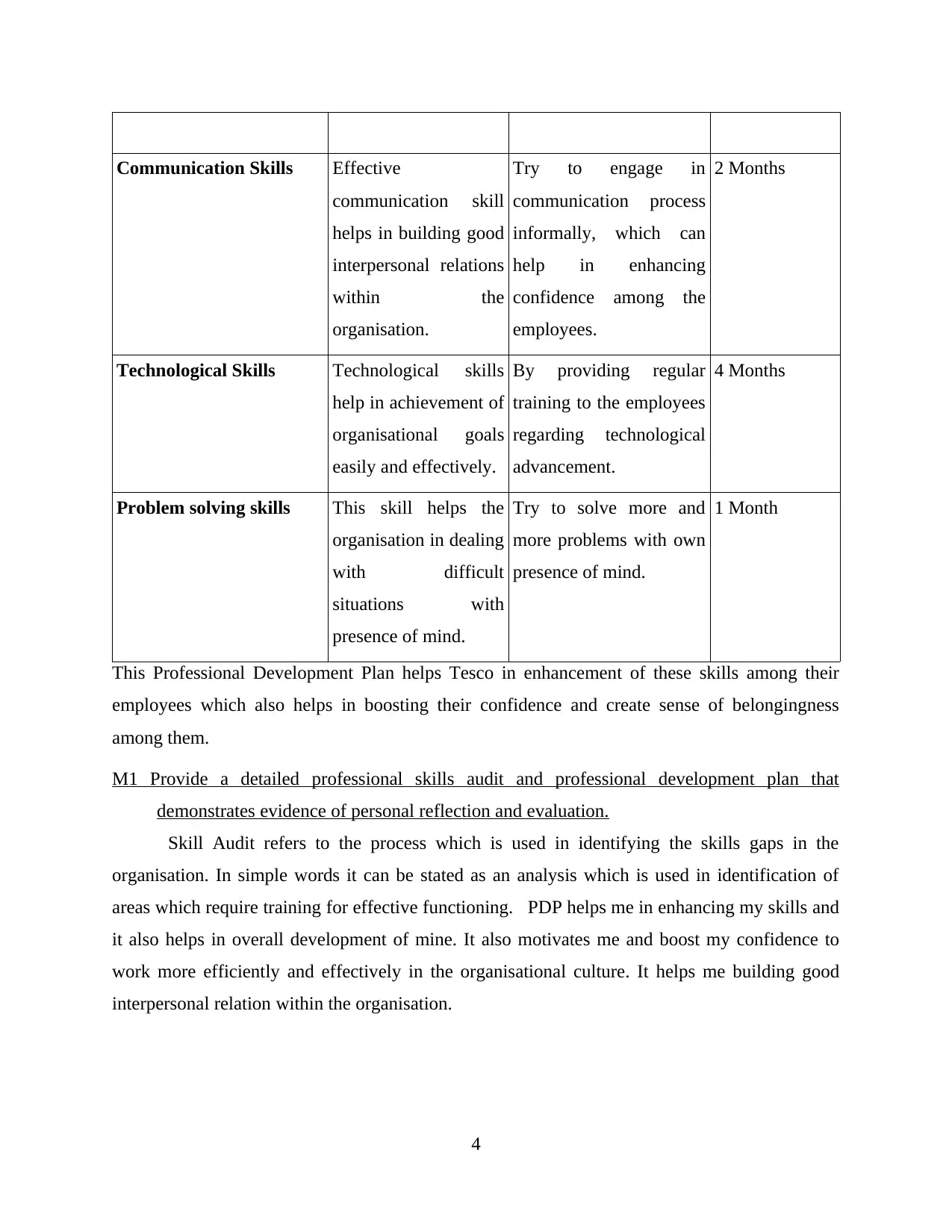
Communication Skills Effective
communication skill
helps in building good
interpersonal relations
within the
organisation.
Try to engage in
communication process
informally, which can
help in enhancing
confidence among the
employees.
2 Months
Technological Skills Technological skills
help in achievement of
organisational goals
easily and effectively.
By providing regular
training to the employees
regarding technological
advancement.
4 Months
Problem solving skills This skill helps the
organisation in dealing
with difficult
situations with
presence of mind.
Try to solve more and
more problems with own
presence of mind.
1 Month
This Professional Development Plan helps Tesco in enhancement of these skills among their
employees which also helps in boosting their confidence and create sense of belongingness
among them.
M1 Provide a detailed professional skills audit and professional development plan that
demonstrates evidence of personal reflection and evaluation.
Skill Audit refers to the process which is used in identifying the skills gaps in the
organisation. In simple words it can be stated as an analysis which is used in identification of
areas which require training for effective functioning. PDP helps me in enhancing my skills and
it also helps in overall development of mine. It also motivates me and boost my confidence to
work more efficiently and effectively in the organisational culture. It helps me building good
interpersonal relation within the organisation.
4
communication skill
helps in building good
interpersonal relations
within the
organisation.
Try to engage in
communication process
informally, which can
help in enhancing
confidence among the
employees.
2 Months
Technological Skills Technological skills
help in achievement of
organisational goals
easily and effectively.
By providing regular
training to the employees
regarding technological
advancement.
4 Months
Problem solving skills This skill helps the
organisation in dealing
with difficult
situations with
presence of mind.
Try to solve more and
more problems with own
presence of mind.
1 Month
This Professional Development Plan helps Tesco in enhancement of these skills among their
employees which also helps in boosting their confidence and create sense of belongingness
among them.
M1 Provide a detailed professional skills audit and professional development plan that
demonstrates evidence of personal reflection and evaluation.
Skill Audit refers to the process which is used in identifying the skills gaps in the
organisation. In simple words it can be stated as an analysis which is used in identification of
areas which require training for effective functioning. PDP helps me in enhancing my skills and
it also helps in overall development of mine. It also motivates me and boost my confidence to
work more efficiently and effectively in the organisational culture. It helps me building good
interpersonal relation within the organisation.
4
Paraphrase This Document
Need a fresh take? Get an instant paraphrase of this document with our AI Paraphraser
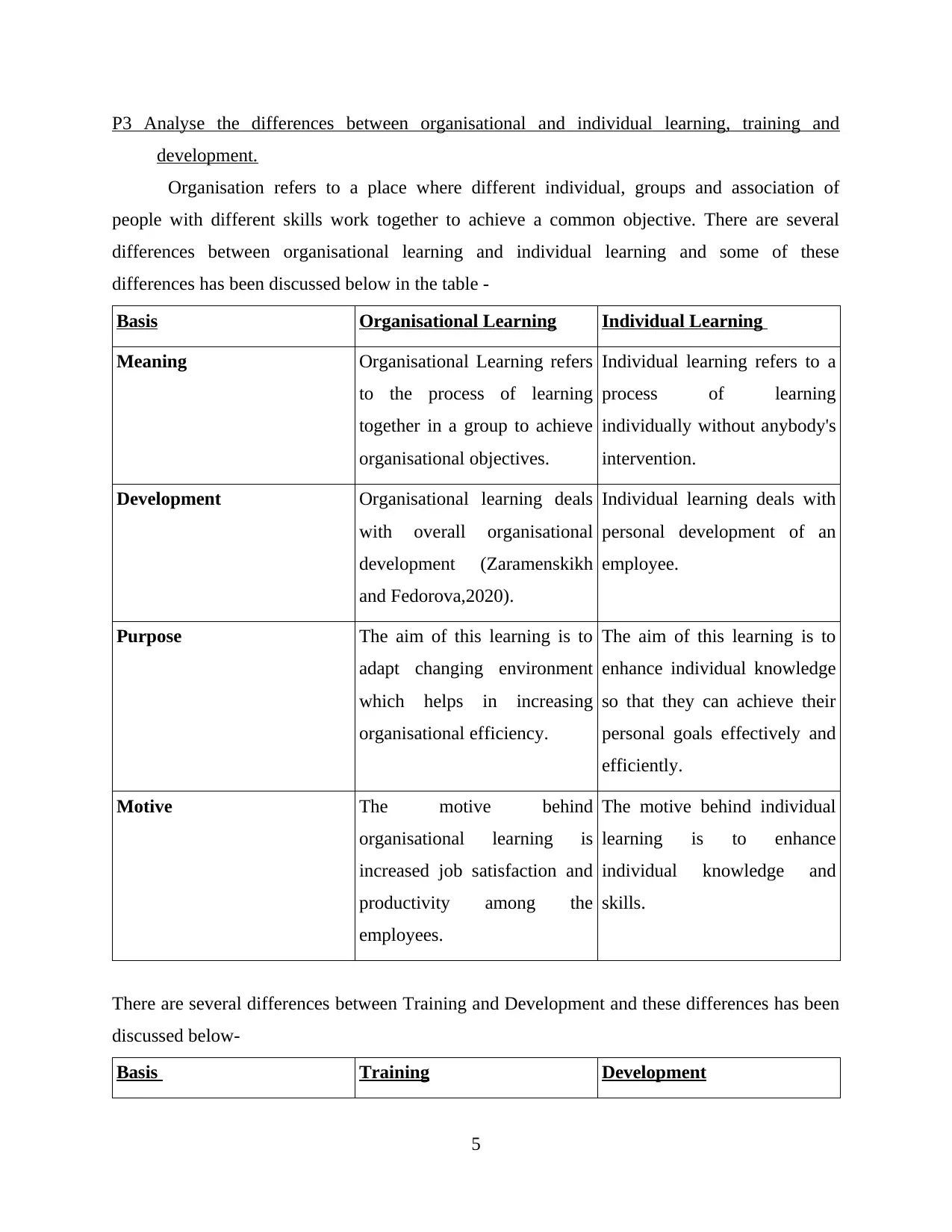
P3 Analyse the differences between organisational and individual learning, training and
development.
Organisation refers to a place where different individual, groups and association of
people with different skills work together to achieve a common objective. There are several
differences between organisational learning and individual learning and some of these
differences has been discussed below in the table -
Basis Organisational Learning Individual Learning
Meaning Organisational Learning refers
to the process of learning
together in a group to achieve
organisational objectives.
Individual learning refers to a
process of learning
individually without anybody's
intervention.
Development Organisational learning deals
with overall organisational
development (Zaramenskikh
and Fedorova,2020).
Individual learning deals with
personal development of an
employee.
Purpose The aim of this learning is to
adapt changing environment
which helps in increasing
organisational efficiency.
The aim of this learning is to
enhance individual knowledge
so that they can achieve their
personal goals effectively and
efficiently.
Motive The motive behind
organisational learning is
increased job satisfaction and
productivity among the
employees.
The motive behind individual
learning is to enhance
individual knowledge and
skills.
There are several differences between Training and Development and these differences has been
discussed below-
Basis Training Development
5
development.
Organisation refers to a place where different individual, groups and association of
people with different skills work together to achieve a common objective. There are several
differences between organisational learning and individual learning and some of these
differences has been discussed below in the table -
Basis Organisational Learning Individual Learning
Meaning Organisational Learning refers
to the process of learning
together in a group to achieve
organisational objectives.
Individual learning refers to a
process of learning
individually without anybody's
intervention.
Development Organisational learning deals
with overall organisational
development (Zaramenskikh
and Fedorova,2020).
Individual learning deals with
personal development of an
employee.
Purpose The aim of this learning is to
adapt changing environment
which helps in increasing
organisational efficiency.
The aim of this learning is to
enhance individual knowledge
so that they can achieve their
personal goals effectively and
efficiently.
Motive The motive behind
organisational learning is
increased job satisfaction and
productivity among the
employees.
The motive behind individual
learning is to enhance
individual knowledge and
skills.
There are several differences between Training and Development and these differences has been
discussed below-
Basis Training Development
5
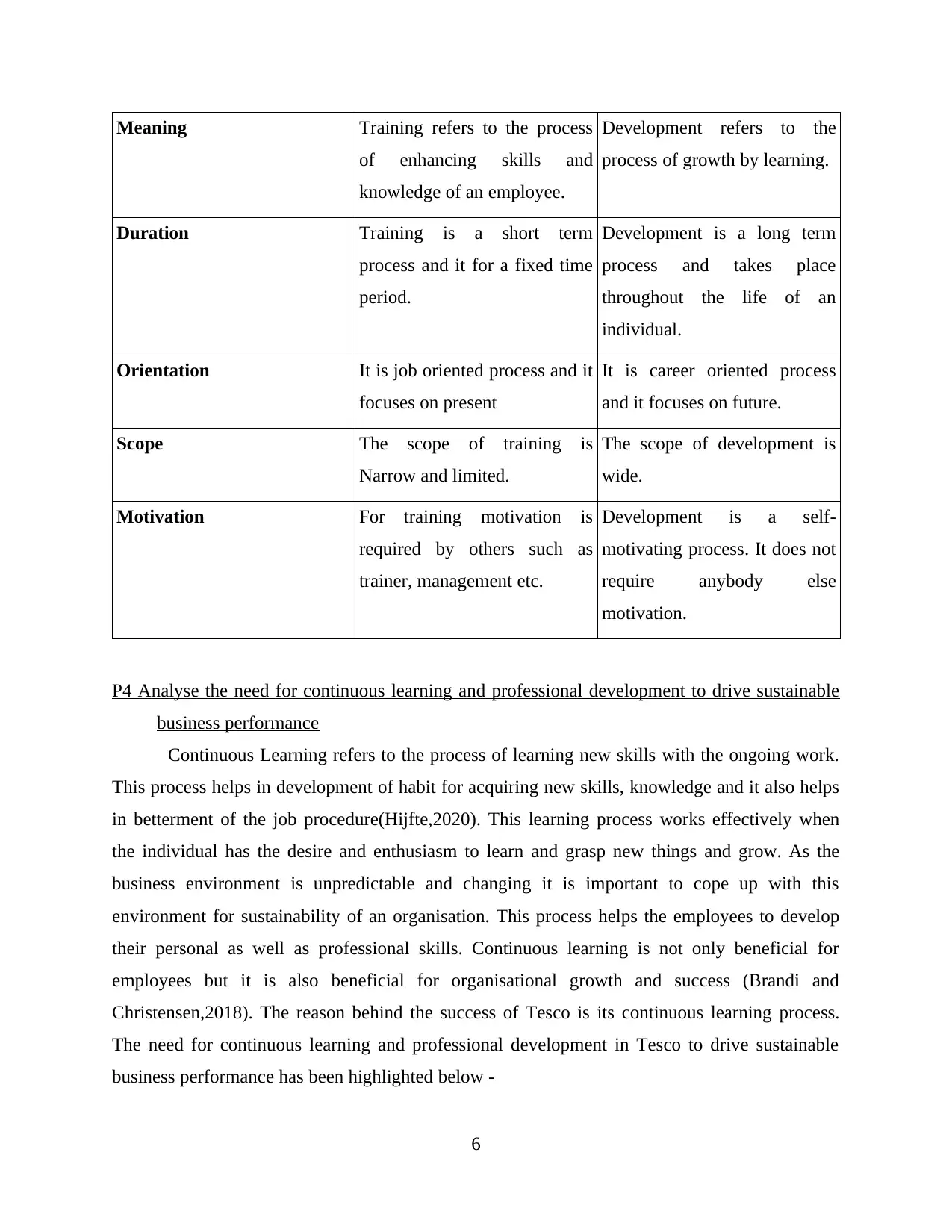
Meaning Training refers to the process
of enhancing skills and
knowledge of an employee.
Development refers to the
process of growth by learning.
Duration Training is a short term
process and it for a fixed time
period.
Development is a long term
process and takes place
throughout the life of an
individual.
Orientation It is job oriented process and it
focuses on present
It is career oriented process
and it focuses on future.
Scope The scope of training is
Narrow and limited.
The scope of development is
wide.
Motivation For training motivation is
required by others such as
trainer, management etc.
Development is a self-
motivating process. It does not
require anybody else
motivation.
P4 Analyse the need for continuous learning and professional development to drive sustainable
business performance
Continuous Learning refers to the process of learning new skills with the ongoing work.
This process helps in development of habit for acquiring new skills, knowledge and it also helps
in betterment of the job procedure(Hijfte,2020). This learning process works effectively when
the individual has the desire and enthusiasm to learn and grasp new things and grow. As the
business environment is unpredictable and changing it is important to cope up with this
environment for sustainability of an organisation. This process helps the employees to develop
their personal as well as professional skills. Continuous learning is not only beneficial for
employees but it is also beneficial for organisational growth and success (Brandi and
Christensen,2018). The reason behind the success of Tesco is its continuous learning process.
The need for continuous learning and professional development in Tesco to drive sustainable
business performance has been highlighted below -
6
of enhancing skills and
knowledge of an employee.
Development refers to the
process of growth by learning.
Duration Training is a short term
process and it for a fixed time
period.
Development is a long term
process and takes place
throughout the life of an
individual.
Orientation It is job oriented process and it
focuses on present
It is career oriented process
and it focuses on future.
Scope The scope of training is
Narrow and limited.
The scope of development is
wide.
Motivation For training motivation is
required by others such as
trainer, management etc.
Development is a self-
motivating process. It does not
require anybody else
motivation.
P4 Analyse the need for continuous learning and professional development to drive sustainable
business performance
Continuous Learning refers to the process of learning new skills with the ongoing work.
This process helps in development of habit for acquiring new skills, knowledge and it also helps
in betterment of the job procedure(Hijfte,2020). This learning process works effectively when
the individual has the desire and enthusiasm to learn and grasp new things and grow. As the
business environment is unpredictable and changing it is important to cope up with this
environment for sustainability of an organisation. This process helps the employees to develop
their personal as well as professional skills. Continuous learning is not only beneficial for
employees but it is also beneficial for organisational growth and success (Brandi and
Christensen,2018). The reason behind the success of Tesco is its continuous learning process.
The need for continuous learning and professional development in Tesco to drive sustainable
business performance has been highlighted below -
6
⊘ This is a preview!⊘
Do you want full access?
Subscribe today to unlock all pages.

Trusted by 1+ million students worldwide
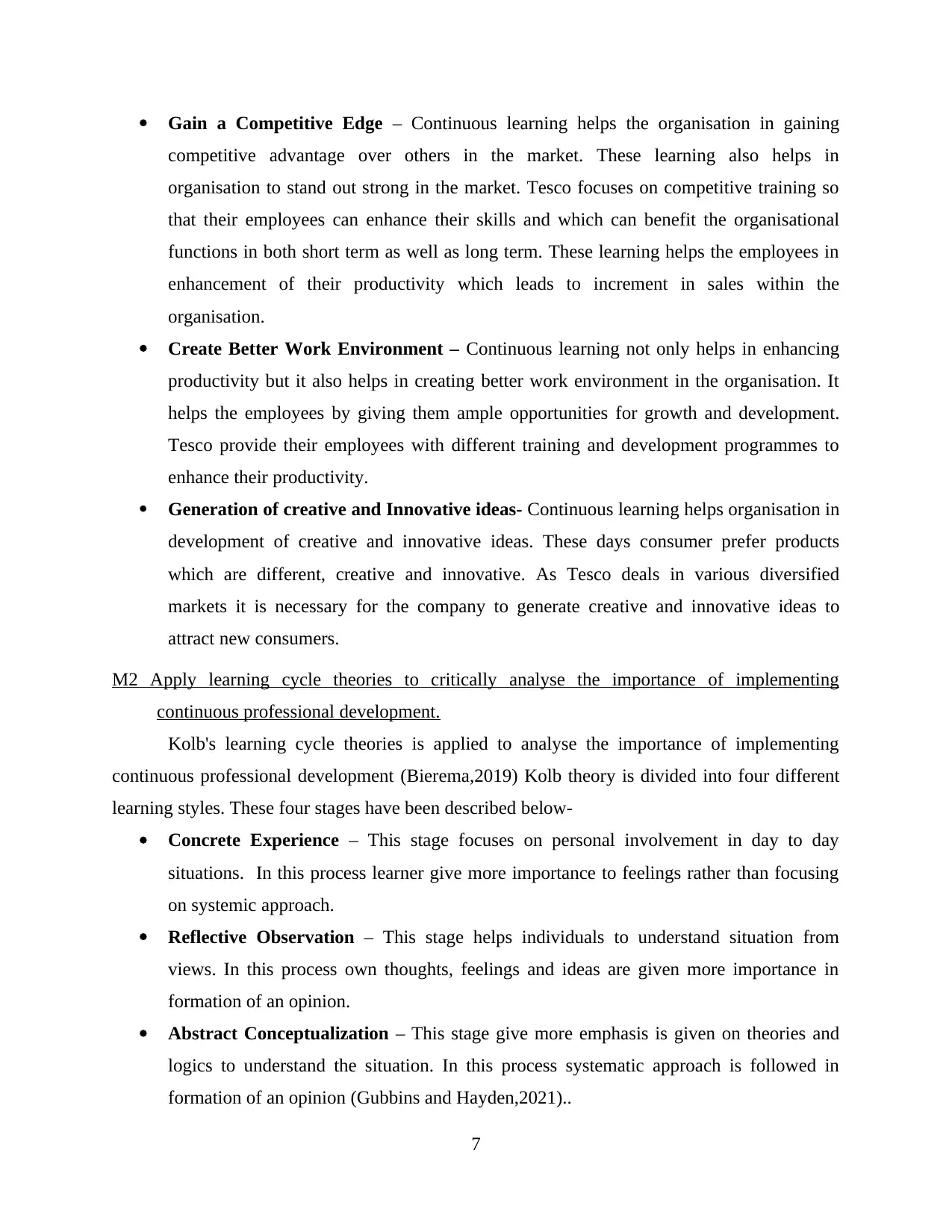
Gain a Competitive Edge – Continuous learning helps the organisation in gaining
competitive advantage over others in the market. These learning also helps in
organisation to stand out strong in the market. Tesco focuses on competitive training so
that their employees can enhance their skills and which can benefit the organisational
functions in both short term as well as long term. These learning helps the employees in
enhancement of their productivity which leads to increment in sales within the
organisation.
Create Better Work Environment – Continuous learning not only helps in enhancing
productivity but it also helps in creating better work environment in the organisation. It
helps the employees by giving them ample opportunities for growth and development.
Tesco provide their employees with different training and development programmes to
enhance their productivity.
Generation of creative and Innovative ideas- Continuous learning helps organisation in
development of creative and innovative ideas. These days consumer prefer products
which are different, creative and innovative. As Tesco deals in various diversified
markets it is necessary for the company to generate creative and innovative ideas to
attract new consumers.
M2 Apply learning cycle theories to critically analyse the importance of implementing
continuous professional development.
Kolb's learning cycle theories is applied to analyse the importance of implementing
continuous professional development (Bierema,2019) Kolb theory is divided into four different
learning styles. These four stages have been described below-
Concrete Experience – This stage focuses on personal involvement in day to day
situations. In this process learner give more importance to feelings rather than focusing
on systemic approach.
Reflective Observation – This stage helps individuals to understand situation from
views. In this process own thoughts, feelings and ideas are given more importance in
formation of an opinion.
Abstract Conceptualization – This stage give more emphasis is given on theories and
logics to understand the situation. In this process systematic approach is followed in
formation of an opinion (Gubbins and Hayden,2021)..
7
competitive advantage over others in the market. These learning also helps in
organisation to stand out strong in the market. Tesco focuses on competitive training so
that their employees can enhance their skills and which can benefit the organisational
functions in both short term as well as long term. These learning helps the employees in
enhancement of their productivity which leads to increment in sales within the
organisation.
Create Better Work Environment – Continuous learning not only helps in enhancing
productivity but it also helps in creating better work environment in the organisation. It
helps the employees by giving them ample opportunities for growth and development.
Tesco provide their employees with different training and development programmes to
enhance their productivity.
Generation of creative and Innovative ideas- Continuous learning helps organisation in
development of creative and innovative ideas. These days consumer prefer products
which are different, creative and innovative. As Tesco deals in various diversified
markets it is necessary for the company to generate creative and innovative ideas to
attract new consumers.
M2 Apply learning cycle theories to critically analyse the importance of implementing
continuous professional development.
Kolb's learning cycle theories is applied to analyse the importance of implementing
continuous professional development (Bierema,2019) Kolb theory is divided into four different
learning styles. These four stages have been described below-
Concrete Experience – This stage focuses on personal involvement in day to day
situations. In this process learner give more importance to feelings rather than focusing
on systemic approach.
Reflective Observation – This stage helps individuals to understand situation from
views. In this process own thoughts, feelings and ideas are given more importance in
formation of an opinion.
Abstract Conceptualization – This stage give more emphasis is given on theories and
logics to understand the situation. In this process systematic approach is followed in
formation of an opinion (Gubbins and Hayden,2021)..
7
Paraphrase This Document
Need a fresh take? Get an instant paraphrase of this document with our AI Paraphraser
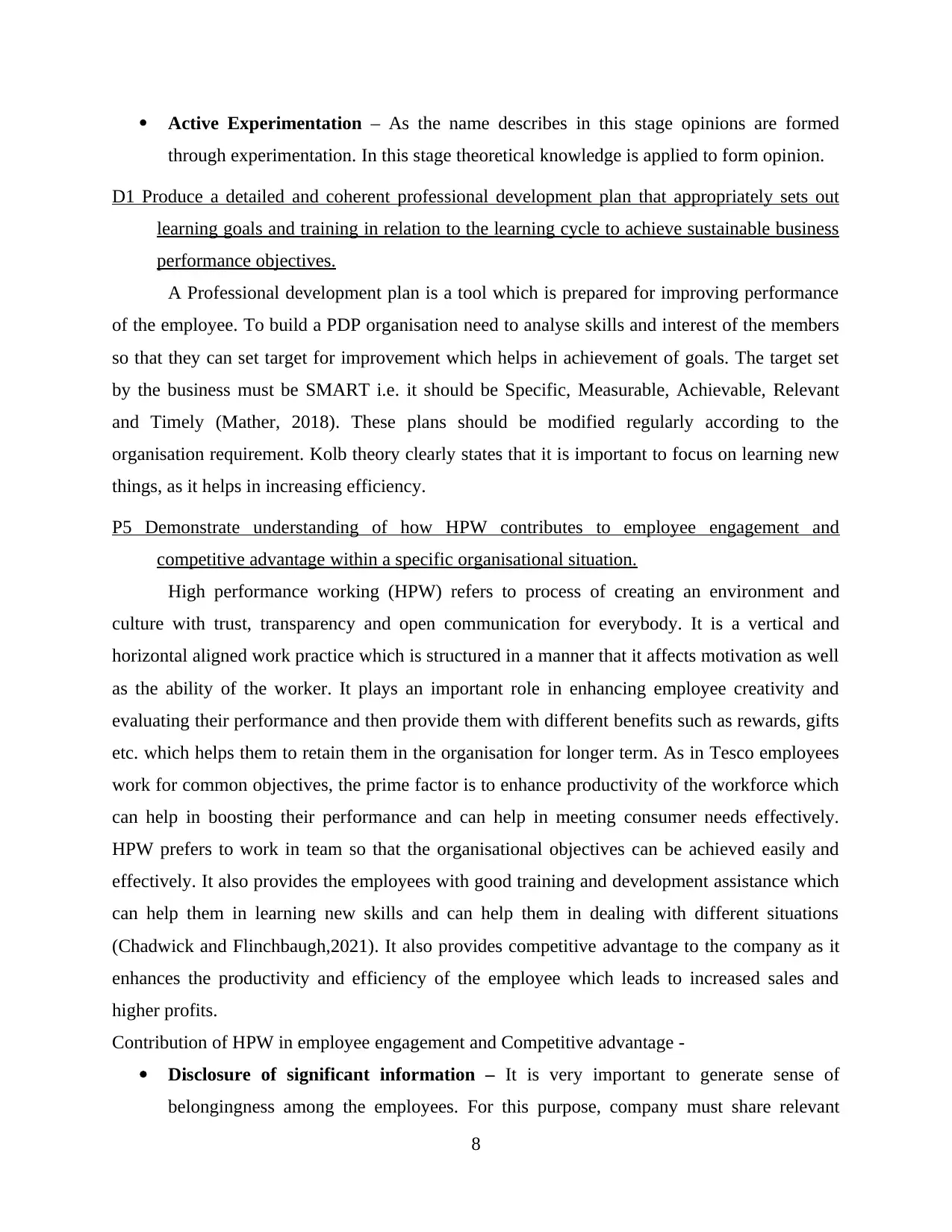
Active Experimentation – As the name describes in this stage opinions are formed
through experimentation. In this stage theoretical knowledge is applied to form opinion.
D1 Produce a detailed and coherent professional development plan that appropriately sets out
learning goals and training in relation to the learning cycle to achieve sustainable business
performance objectives.
A Professional development plan is a tool which is prepared for improving performance
of the employee. To build a PDP organisation need to analyse skills and interest of the members
so that they can set target for improvement which helps in achievement of goals. The target set
by the business must be SMART i.e. it should be Specific, Measurable, Achievable, Relevant
and Timely (Mather, 2018). These plans should be modified regularly according to the
organisation requirement. Kolb theory clearly states that it is important to focus on learning new
things, as it helps in increasing efficiency.
P5 Demonstrate understanding of how HPW contributes to employee engagement and
competitive advantage within a specific organisational situation.
High performance working (HPW) refers to process of creating an environment and
culture with trust, transparency and open communication for everybody. It is a vertical and
horizontal aligned work practice which is structured in a manner that it affects motivation as well
as the ability of the worker. It plays an important role in enhancing employee creativity and
evaluating their performance and then provide them with different benefits such as rewards, gifts
etc. which helps them to retain them in the organisation for longer term. As in Tesco employees
work for common objectives, the prime factor is to enhance productivity of the workforce which
can help in boosting their performance and can help in meeting consumer needs effectively.
HPW prefers to work in team so that the organisational objectives can be achieved easily and
effectively. It also provides the employees with good training and development assistance which
can help them in learning new skills and can help them in dealing with different situations
(Chadwick and Flinchbaugh,2021). It also provides competitive advantage to the company as it
enhances the productivity and efficiency of the employee which leads to increased sales and
higher profits.
Contribution of HPW in employee engagement and Competitive advantage -
Disclosure of significant information – It is very important to generate sense of
belongingness among the employees. For this purpose, company must share relevant
8
through experimentation. In this stage theoretical knowledge is applied to form opinion.
D1 Produce a detailed and coherent professional development plan that appropriately sets out
learning goals and training in relation to the learning cycle to achieve sustainable business
performance objectives.
A Professional development plan is a tool which is prepared for improving performance
of the employee. To build a PDP organisation need to analyse skills and interest of the members
so that they can set target for improvement which helps in achievement of goals. The target set
by the business must be SMART i.e. it should be Specific, Measurable, Achievable, Relevant
and Timely (Mather, 2018). These plans should be modified regularly according to the
organisation requirement. Kolb theory clearly states that it is important to focus on learning new
things, as it helps in increasing efficiency.
P5 Demonstrate understanding of how HPW contributes to employee engagement and
competitive advantage within a specific organisational situation.
High performance working (HPW) refers to process of creating an environment and
culture with trust, transparency and open communication for everybody. It is a vertical and
horizontal aligned work practice which is structured in a manner that it affects motivation as well
as the ability of the worker. It plays an important role in enhancing employee creativity and
evaluating their performance and then provide them with different benefits such as rewards, gifts
etc. which helps them to retain them in the organisation for longer term. As in Tesco employees
work for common objectives, the prime factor is to enhance productivity of the workforce which
can help in boosting their performance and can help in meeting consumer needs effectively.
HPW prefers to work in team so that the organisational objectives can be achieved easily and
effectively. It also provides the employees with good training and development assistance which
can help them in learning new skills and can help them in dealing with different situations
(Chadwick and Flinchbaugh,2021). It also provides competitive advantage to the company as it
enhances the productivity and efficiency of the employee which leads to increased sales and
higher profits.
Contribution of HPW in employee engagement and Competitive advantage -
Disclosure of significant information – It is very important to generate sense of
belongingness among the employees. For this purpose, company must share relevant
8
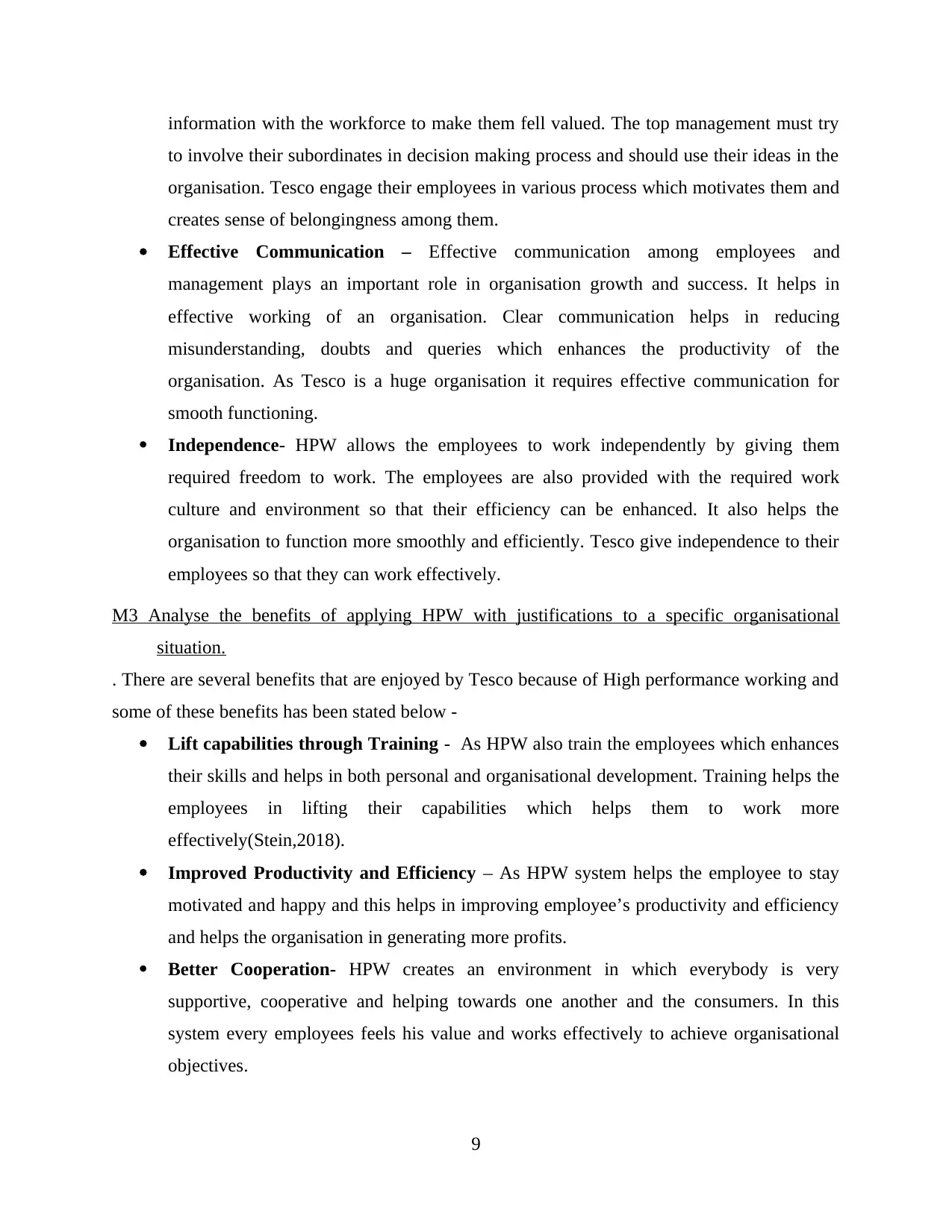
information with the workforce to make them fell valued. The top management must try
to involve their subordinates in decision making process and should use their ideas in the
organisation. Tesco engage their employees in various process which motivates them and
creates sense of belongingness among them.
Effective Communication – Effective communication among employees and
management plays an important role in organisation growth and success. It helps in
effective working of an organisation. Clear communication helps in reducing
misunderstanding, doubts and queries which enhances the productivity of the
organisation. As Tesco is a huge organisation it requires effective communication for
smooth functioning.
Independence- HPW allows the employees to work independently by giving them
required freedom to work. The employees are also provided with the required work
culture and environment so that their efficiency can be enhanced. It also helps the
organisation to function more smoothly and efficiently. Tesco give independence to their
employees so that they can work effectively.
M3 Analyse the benefits of applying HPW with justifications to a specific organisational
situation.
. There are several benefits that are enjoyed by Tesco because of High performance working and
some of these benefits has been stated below -
Lift capabilities through Training - As HPW also train the employees which enhances
their skills and helps in both personal and organisational development. Training helps the
employees in lifting their capabilities which helps them to work more
effectively(Stein,2018).
Improved Productivity and Efficiency – As HPW system helps the employee to stay
motivated and happy and this helps in improving employee’s productivity and efficiency
and helps the organisation in generating more profits.
Better Cooperation- HPW creates an environment in which everybody is very
supportive, cooperative and helping towards one another and the consumers. In this
system every employees feels his value and works effectively to achieve organisational
objectives.
9
to involve their subordinates in decision making process and should use their ideas in the
organisation. Tesco engage their employees in various process which motivates them and
creates sense of belongingness among them.
Effective Communication – Effective communication among employees and
management plays an important role in organisation growth and success. It helps in
effective working of an organisation. Clear communication helps in reducing
misunderstanding, doubts and queries which enhances the productivity of the
organisation. As Tesco is a huge organisation it requires effective communication for
smooth functioning.
Independence- HPW allows the employees to work independently by giving them
required freedom to work. The employees are also provided with the required work
culture and environment so that their efficiency can be enhanced. It also helps the
organisation to function more smoothly and efficiently. Tesco give independence to their
employees so that they can work effectively.
M3 Analyse the benefits of applying HPW with justifications to a specific organisational
situation.
. There are several benefits that are enjoyed by Tesco because of High performance working and
some of these benefits has been stated below -
Lift capabilities through Training - As HPW also train the employees which enhances
their skills and helps in both personal and organisational development. Training helps the
employees in lifting their capabilities which helps them to work more
effectively(Stein,2018).
Improved Productivity and Efficiency – As HPW system helps the employee to stay
motivated and happy and this helps in improving employee’s productivity and efficiency
and helps the organisation in generating more profits.
Better Cooperation- HPW creates an environment in which everybody is very
supportive, cooperative and helping towards one another and the consumers. In this
system every employees feels his value and works effectively to achieve organisational
objectives.
9
⊘ This is a preview!⊘
Do you want full access?
Subscribe today to unlock all pages.

Trusted by 1+ million students worldwide
1 out of 16
Related Documents
Your All-in-One AI-Powered Toolkit for Academic Success.
+13062052269
info@desklib.com
Available 24*7 on WhatsApp / Email
![[object Object]](/_next/static/media/star-bottom.7253800d.svg)
Unlock your academic potential
Copyright © 2020–2026 A2Z Services. All Rights Reserved. Developed and managed by ZUCOL.




